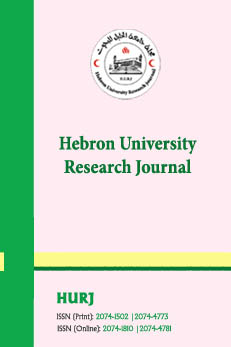News Archive
Hebron University Organizes a Seminar on the Palestinian Strategy after the United Nations Statehood Vote
Hebron, Palestine, 10 December 2012 – the Legal Clinic of Hebron University held a seminar on "The Palestinian Strategy after the United Nations Statehood Vote", with the participation figures included all the political spectrum, members of the Palestinian Legislative Council, representatives of political parties and independent figures, academics, journalists and students. The seminar aimed to identify the a number of measures that should be adopted by the Palestinians at the internal and external levels including, national reconciliation, PLO reform, joining the International Criminal Court, issuance of nationality law and passports, holding the presidential and legislative elections, and adopting a new constitution.
Speakers at the seminar were Dr. Mutaz Qafisheh, Professor of International Law and Legal Clinic Director, Hebron University, "Available Palestinian Measures under International Law"; Dr. Nabil Shaath, Member of the Central Committee of Fatah "PLO Reform Prospects after the Recognition of the State"; Dr. Aziz Dweik, Speaker, Palestinian Legislative Council, "Palestinian Reconciliation Prospects after the Recognition of the State"; Dr. Omar Awad Allah, Head, Multilateral Relations Sector, Ministry of Foreign Affairs, "Admission of Palestine to UN Specialized Agencies and other Global Organizations"; and Dr. Nabil Al-Jab'ari, Chairman of the Board of Trustees, Hebron University, "The Current Palestinian Situation and the Desired Strategy. The seminar was moderated by Dr. Salah Shrouf, Dean, Faculty of Literature, Hebron University. In depth debate, including questions by the audience, took place.
At the end of the event, the participants recommended the following:
- The prosecutor of the International Criminal Court (ICC) would not hesitate as of now to accept Palestine’s application to the 1998 Rome Statute that established the ICC. The former ICC’s prosecutor justified his decision of 3 April 2012 to defer the Palestinian application to the ICC chiefly on the ground that Palestine was not a State then. Now the prosecutor would be compelled to investigate and might issue arrest warrants, through the Interpol, to the police of 121 States members of the Rome Statute who would be under an obligation to drag accused war criminals to The Hague. This is the main reason the Israeli politicians fear Palestine’s UN move.
- Two international humanitarian law instruments should be ratified by Palestine immediately: Geneva Conventions III and IV. The enforcement of Convention III indicates that Palestinian prisoners in Israeli jails – currently treated as ordinary criminals by Israel – would be accorded the status of prisoners of war (POW) in the eyes of the international community. Such POWs, by virtue of Article 118 of the said Convention, should be released upon cessation of hostilities. In the likely event of Israel’s non-compliance, Palestine could resort to remedies available under the Convention, including calling upon the High Contracting Parties, under Article 132, to turn to the ICC, under Article 8(2)(a)(vi) of the Rome Statute, that considers arbitrary detention or the failure to adhere to fair trial standards as war crime.
- Palestine could now join all human rights treaties. The State was able to become a Party to certain treaties, such as the two human rights covenants, after its admission to the UN Educational, Scientific, Social and Cultural Organization (UNESCO) on 31 October 2012, as per Article 48 of the International Covenant on Civil and Political Rights and Article 26(1) of the International Covenant on Economic, Social and Cultural Rights. Now, all human rights treaties are open to the State’s ratification, including the other seven core conventions (i.e. conventions on racial discrimination, torture, women, child, disability, disappearance, migrant workers).
- International diplomatic and consular law, set out respectively by the Vienna conventions of 1961 (diplomatic) and 1963 (consular), could provide the State of Palestine, after accession, with the right to send and receive diplomatic and consular missions as it wishes. A problem would arise if Israel denies certain States to send diplomatic or consular personnel into Palestine. In these cases, such States, along with Palestine, would have the right to complain against Israel before the International Court of Justice under the optional protocols to these conventions concerning the compulsory settlement of disputes. The State of Palestine could, as a matter of right for Palestine and as an obligation of the receiving States, afford diplomatic protection to its citizens abroad and to serve them through its consular staff.
- The law of the sea relates to the coastal area overlooking the Mediterranean in the Gaza Strip, as well as to the West Bank, which is landlocked territory. By ratifying the 1982 United Nations Convention on the Law of the Sea, the State of Palestine may then claim sovereignty over its territorial waters (12 nautical miles or 22.224 km), its jurisdiction on its contiguous zone (24 nautical miles) and exclusive economic zone (200 nautical miles or a bit over 370 km at the Gaza coast). If the Israeli navy denies the Palestinians from using these areas – for any purpose such as transport, fishing, constructing ports or exploring for gas – Palestine may revert to the optional settlement measures recognized in Article 287(1) of the Convention: the International Tribunal for the Law of the Sea in Hamburg, the International Court of Justice, or arbitration. Although Israel is not presently a party to the Convention, Palestine could still use diplomatic means to approach the Convention’s 163 State Parties.
- Palestine was already a member of other intergovernmental organizations such as the League of Arab States and UN Economic Committee for Western Asia. The latest vote would make it easier for Palestine to join further UN specialized agencies, including the World Health Organization (WTO), the International Labour Organization (ILO), the World Bank and the World Trade Organization (WTO). Article 3 of the WHO Constitution, for instance, stipulates that ‘Membership in the Organization shall be open to all States.’ Palestine could resort to the Dispute Settlement Body of the WTO to complain against Israel if this State continues its restrictions on Palestinian imports, exports, taxes, customs and prices’ control. The WTO is expected to take certain measures against Israel should it maintains imposing restrictions on the Palestinian economy and freedom to trade.
- Enacting a Palestinian citizenship/nationality law would have different effects today than it would have had before the UNGA vote. According to international law, Palestine may define its population as it may deem fit. It could, based on citizenship law, issue Palestinian passports that would be ipso facto recognized by other States—or at least by the States that voted in favor of Palestine’s statehood bid. Palestine, then, could claim diplomatic protection for its citizens abroad, as mentioned above. Citizenship is a precondition for filing cases for violations against citizens under international criminal law, humanitarian law, refugee law and human rights, including extradition, and for the context of the elections for the Palestinian National Council.
- It is high time for Palestine to initiate elections for its State institutions considering the lack of popular legitimacy for any of the ‘governments’ that are in place in both Ramallah and Gaza. In Ramallah, the term of President Mahmoud Abbas, who was elected in 2004, had lapsed in 2008, and the term of the Hamas government in Gaza, which won the parliamentary majority in the 2006 elections, had ended in 2010.
- The constitution is a fundamental instrument to construct and sustain the political system of Palestine and realize its ability to act as a State. The current 2003 Amended Palestinian Basic Law was drafted for an authority that would function for a transitional period. It is not sufficient to regulate the political system of a State. A committee was set up to draft the constitution, which has resulted in the production of a number of bills. These might be considered as a starting point for finalizing a constitutional draft that reflects a democratic State of Palestine, which should ultimately be put up for referendum by the Palestinian people.
- One of the features of any State is to have a national currency. According to the Paris Protocol that was signed between the PLO and Israel in 1994 as part of the Oslo Accords (PLO-Israel Interim Agreements), Palestine could have adopted a national currency at an earlier stage. If adopted in the absence of the formally recognized State, the recognition of this currency might have been questioned at the international financial markets. This concern is now diminished as very few would be able to question the validity of the ‘Palestinian Pound’ after its issuance by a formally sovereign central bank.
- Legislative reform is an indispensable tool for the execution of most international and local measures highlighted in this note. Such reforms would relate to ensuring that domestic law is in line with Palestine’s international human rights obligations, to the implementation of the ICC’s Rome Statute and the Geneva conventions, along with other legal instruments ratified by Palestine. Palestine’s prospective admission to international organizations would require reforming a number of legislation. For example, reforming business and investment law is necessary to adhere to WTO’s standards, improving labour law is needed for ILO’s membership, and adopting modern cultural heritage law is significant for the UNESCO’s membership which Palestine has been already entered. It is also necessary to unify the law between the West Bank and Gaza whose laws differ considerably due to the legal systems that were inherited from the Ottoman, British, Egyptian and Israeli regimes over the past 100 years.
- Enacting legislation, ratifying treaties, approaching international tribunals and entering international organizations are all steps that require technical preparation and institutional reform. They also require recruiting and building the capacity of the individuals who would be able to perform analytical studies, provide reports to international forums, plead before courts, represent the country in embassies abroad, be hired by international organizations as staff members and experts, offer consular and diplomatic services to citizens abroad and set strategic plans for legislative reform. All these steps require the allocation of adequate financial resources.





